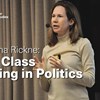class

Johanna Rickne: The Class Ceiling in Politics
Research seminar with Johanna Rickne, professor of Economics at SOFI, Stockholm University Abstract: Prior studies have documented that working-class individuals rarely become parliamentarians. We kno
Someone to sit next to in the segregated class room
“Who in your class would you not like to sit next to?” This question was posed to almost 5000 pupils (age 14–15) at Swedish high schools 2010/2011. Many adolescents experience systematic rejection duri
Class, Values, and Attitudes Towards Redistribution: A European Comparison
European Sociological Review June 22, 2011. European Sociological Review, Vol 29 (2013) pp 155–167. DOI:10.1093/esr/jcr046, available online at www.esr.oxfordjournals.org Abstract Using data from the Europ
Research seminar with Johanna Rickne: The Class Ceiling in Politics
Venue: Institutet för framtidsstudier, Holländargatan 13, 4th floor, Stockholm, or online.Research seminar with Johanna Rickne, professor of Economics at SOFI, Stockholm University.Register hereAbstracPrior studies have documented that working-class individuals rarely become parliamentarians. We know less about when in the career pipeline to parliament workers disappear, and why. We study these questions using detailed data on the universe of Swedish politicians’ careers over a 50-year period. We find roughly equal-sized declines in the proportion of workers on various rungs of the political career ladder ranging from local to national office. We reject the potential explanations that workers lack political ambition, public service motivation, honesty, or voter support. And while workers’ average high school grades and cognitive test scores are lower, this cannot explain their large promotion disadvantage, a situation that we label a class ceiling. Organizational ties to blue-collar unions help workers advance, but only to lower-level positions in left-leaning parties. We conclude that efforts to improve workers’ numerical representation should apply throughout the career ladder and focus on intra-party processes.
Age, Class, and Attitudes Towards Government Responsibilities
Svallfors, Stefan (Red.) Contested Welfare States? Welfare Attitudes in Europe and Beyond Stanford, CA: Stanford University Press, 2012, s 158-192.
Middle-Class Precarity and the Re-Legitimation of the Welfare State
Professor Michael Shalev, Department of Sociology, Hebrew University, Jerusalem Seminars host is Stefan Svallfors. The seminars are free of charge and take place at 13.00–14.30 in the Institute’s semin
The intersection of class origin and immigration background in structuring social capital: the role of transnational ties
The British Journal of Sociology, vol 69, no 1, pp 99-123, doi: 10.1111/1468-4446.12289. Abstract The study investigates inequalities in access to social capital based on social class origin and immigra
Do poorer youth have fewer friends? The role of household and child economic resources in adolescent school-class friendships
Children and Youth Services Review, In Press, Accepted Manuscript. Published online before print August 21, 2015, doi:10.1016/j.childyouth.2015.08.013 Poverty among children and adolescents attracts con
It' about class: Why children with immigrant parents have lower grades but higher ambitions
Previous research has shown that children of immigrant parents have worse grades in school than children with at least one parent born in Sweden. Yet, these children have higher ambitions with their edI
Research seminar with Claes Lernestedt: Frankenstein's Heirs
Venue: Institutet för framtidsstudier, Holländargatan 13, 4th floor, Stockholm, or online.Research seminar with Claes Lernestedt, Professor of Law, Stockholm University.Register hereAbstract This resear, has (at least formally) yet to start. The project might be thought of as interdisciplinary, with a base in law (I’m a criminal law professor), Thoughts presented will be very tentative, and I welcome any kind of input.








